Maryland auto mechanic balances life helping victims of natural disasters
Hurricane Harvey is the latest natural disaster to rock the beleaguered Gulf Coast.
As President Trump prepares to make his first official trip to inspect hurricane-ravaged Puerto Rico, Maryland-based auto mechanic Mark Wigley is methodically packing up his Chevy van.
Air Force One will most likely touch down in San Juan sometime next Tuesday morning. By that point, Wigley and a crew of seven Christian volunteers will be on the ground in New Orleans.
For Wigley, the trek to Katrina-battered Louisiana is nothing new. Previous trips to the area have also included stops to aid victims of Hurricane Ike. There was a week in Madison, Alabama after the horrific 2011 tornado and a couple of trips to Staten Island in the wake of Hurricane Sandy. Twenty-eight trips by Wigley’s reckoning – or maybe more.
“To tell you the truth, I’ve kinda lost count,” admitted Wigley.
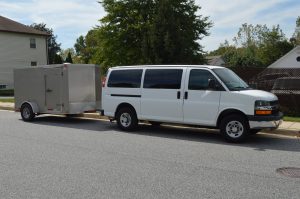
On a sunny day in Baltimore, while he stood replacing wheel bearings on a family van, Wigley and I talked about the eight years he has spent helping the victims of natural disasters.
“I was thinking on this trip they would redirect us to Houston, but they have ongoing projects in New Orleans they’d like to get wrapped up. One of the reasons they are anxious to get us back into NOLA is that 99% of the people who are now volunteering want to go to Houston, Texas.”
The “they” Wigley speaks of is an organization called Reach Global Crisis Response (RGCR).
A ministry of the Evangelical Free Church in America, RGCR has nailed-down the art of volunteer coordination, by partnering with local churches in disaster-stricken areas. Reach Global’s ultimate mission is the propagation of the Gospel of Christ. But they do it by helping – not preaching to – individuals and families in need.
“The teams I’m taking with me will be working on building-related projects, while I work on some of the used vehicles that have been donated to RGCR. There’s still a lot of work to do in New Orleans, and the volunteers who fly in rely heavily on the donated vehicles. I know there’s a transmission job on a Ford van and an air conditioner evaporator replacement on a Chevy Suburban. There’s also a manifold job sitting there, where the bolts have broken off in the head. I’m hoping another mechanic will already have those bolts drilled out by the time I arrive. The two things I hate to do on a car are drilling out bolts and sanding away rust.”
An ASE Master Technician with more than forty years in the auto repair field, Wigley trained for the trade by attending Western Vocational Tech in Baltimore County. He also helped his late father, Roger, maintain a fleet of buses at Arlington Baptist Church and School. When his last boss sold him the then double-bay business in 1987, he took a cue from his baptism and renamed the shop New Life Automotive.
For Wigley, his faith and the mechanics trade have always gone hand-in-hand.
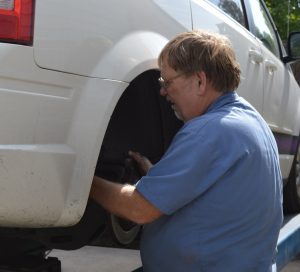
“We were on our way south, on one of our trips, driving around Washington D.C., when one of the wheels on the back of the van started smoking. If you’ve ever been on the Capital Beltway, you know that’s not a place you want to break down! We finally got to a safe spot near Tysons Corner, where I could pull over to see what the problem was.
“It appeared to me that the brakes had overheated. We had to let it cool down before I could work on them, so while we were waiting, one of the guys found some broken cinder blocks near the side of the road. He chocked the front wheels with the blocks, while I slowly jacked the van up. I asked if there were anymore blocks laying around we could use to support the rear axle. The guys said, ‘No, but there’s a jack stand over here in the grass. Can you use that?’
“People say they don’t believe in miracles, but what are the chances, in a situation like that, where you just happen to find a mechanic’s jack stand laying there by the side of the road?”
Wigley told me he has also seen the hand of God at work in the lives of various storm victims he has met.
“I remember working on the house of one particular young couple in Pascagoula, Mississippi. They were hit with four feet of water, so we were ripping out walls and floors to help them rebuild. When I asked the young man how he was doing, he kinda shrugged his shoulders and said, ‘fine.’
“I said, ‘No – please tell me how you are REALLY doing.’
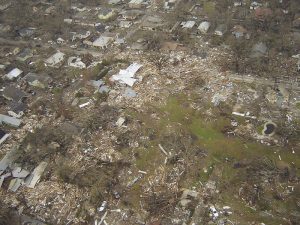
“He replied, ‘I’m blessed. Nineteen people here in this town lost their lives. I’ve still got my entire family. God said he ‘would never leave us or forsake us.’ I see that in the waves of volunteers who have come down here to help us rebuild. They are walking through this heartache with us, and I know we are going to get through this.’
“I thought that showed a lot of maturity for a young man in his early twenties with two small babies. It’s people like that who make you want to keep going back and doing more.”
For the present time, ‘more’ means working on the donated vehicles at RGCR headquarters in Covington, Louisiana.
As for Houston?
“I’ll probably find my way to Houston on my next trip. I’ve already got a lot of young people at church, asking, ‘Mr. Mark! When can we go?’
“Reach Global is setting up three locations around Houston. They have a church in Corpus Christi; another in a town called Friendswood, which is between Galveston and Houston. They are desperately looking for some warehouse space – a place where they can set up bunks and showers for the incoming teams.”
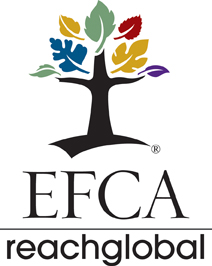
As a volunteer organization, visiting teams pay their way down and back. They also pay a modest tab for communal meals, though the locals will host individual teams whenever they can. Wigley said the coordinating teams from Reach Global are also serving on a non-salaried basis. Their expenses are covered entirely by fellow Christians in unaffected areas.
One of the other ways people are helping is with material donations. Along with the donated vehicles, local churches, caring individuals and some civic-minded groups have donated clothing, hand tools, building supplies and more than a few stepladders.
Others have elected to send the volunteers out with Home Depot and Lowes gift cards, or have power tools delivered via a special wish list page at Amazon. Wigley’s home congregation (Countryside Fellowship Church in Savage, Maryland) has been collecting gift cards. Many others have dropped off supplies and gift cards at Wigley’s Halethorpe, Maryland location.
“The nice thing with the gift cards is 100% goes to help a family in crisis. We’re taking about $2,000 in cards with us on this upcoming trip.
“Reach Global doesn’t stand on a street corner handing these cards out. They are working with stricken families who they have come to know, so they can gauge the real needs in each situation. All they promise at the outset is the volunteer help. As donated supplies, tools and the gift cards come in, that’s another way to help the families in need.
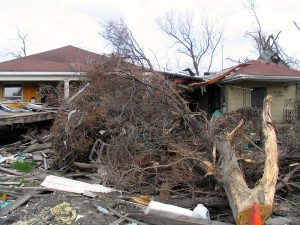
“Most Katrina victims did not have any flood insurance. A lot of these people are still paying a mortgage on a house they cannot live in, while also paying to rent someplace else. Twice last year, some generous folks sent me down with a stack of gift cards. The homeowners we were serving accepted them with tears of gratitude in their eyes. You can not imagine what a small thing like this can mean to folks in the South during a time like this.”
Wigley spoke a bit more about his burden for New Orleans, and his desire to get to Houston (“I’m told it’s really hot down there”.) Given the desperate needs in the Caribbean, I asked if he thought a future trip might take him to Puerto Rico or the Virgin Islands?
“Reach Global has been heavily involved in Haiti for a number of years, so I suspect they’ll also end up in Puerto Rico and the Virgin Islands. Mark Lewis (director of RGCR) is in Mexico City right now. He flew over Florida and guessed that there is a good six weeks worth of tree work to be done. Lewis noted that there are a lot of other groups on the ground, so RGCR is not really involved at this point. The worst area hit, of course, was the Keys, and they don’t have a church there to partner with.
“The partnership aspect is essential to what they do.
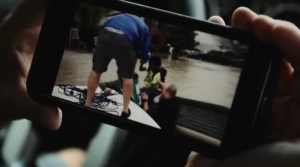
“As I was saying before, the local churches know the residents, and they know the specific needs, so the money and manpower is allotted in a far more efficient way. Lewis met with 11 pastors in Houston – and I believe he did the same thing in Florida. He laid out the model Reach Global has fine-tuned in New Orleans, as a result of their experience with Hurricane Katrina. Reach Global may not be directly tied to a particular church’s relief efforts, but they are there in the background so that pastors and elders don’t have to reinvent the wheel.
“They are also there to assist local churches in the spiritual realm.
“One of the things one pastor told me is that when he went to seminary, nobody taught him how to minister to a congregation which has been hit by the worst disaster in American history. He said, ‘I simply had no training.’”
Of course, neither did Wigley, when he made his first trip to Mississippi some eight years ago.
Twenty-eight trips means a lot of brotherly mileage for a man with an auto repair business to run. But Wigley maintains he has been blessed ten-fold in many other ways. On the business end, his son Nathan and his long-time staff keep things humming whenever Wigley is away.
And then, there are the lasting friendships he has made.
“To tell the truth, I feel like I have a second home down there.
“There are a lot of good people in this country. You don’t realize it til you step out of your comfort zone and experience the trauma other people are going through. It’s a long drive, and it seems like it gets longer each time I go. But you come home very grateful for what you have.”
* * * * *
For those interested in helping with this ongoing effort, gift cards can be mailed to Countryside Fellowship Church, 8850 Baltimore St., Savage, MD 21763 or dropped off at New Life Automotive, Inc., 4301 Washington St., Halethorpe, MD 21227. If you would like to make a gift toward traveling expenses and Mark’s work with Reach Global Crisis Response, tax deductible donations can be sent to Countryside Fellowship Church.
Editor’s note: This is the seventeenth part of an ongoing series which will look at the places and people that make up the rich history and diverse nature of spirituality, belief, and observance in Baltimore and beyond. Read the series here.

Anthony C. Hayes is an actor, author, raconteur, rapscallion and bon vivant. A one-time newsboy for the Evening Sun and professional presence at the Washington Herald, Tony’s poetry, photography, humor, and prose have also been featured in Smile, Hon, You’re in Baltimore!, Destination Maryland, Magic Octopus Magazine, Los Angeles Post-Examiner, Voice of Baltimore, SmartCEO, Alvarez Fiction, and Tales of Blood and Roses. If you notice that his work has been purloined, please let him know. As the Good Book says, “Thou shalt not steal.”
